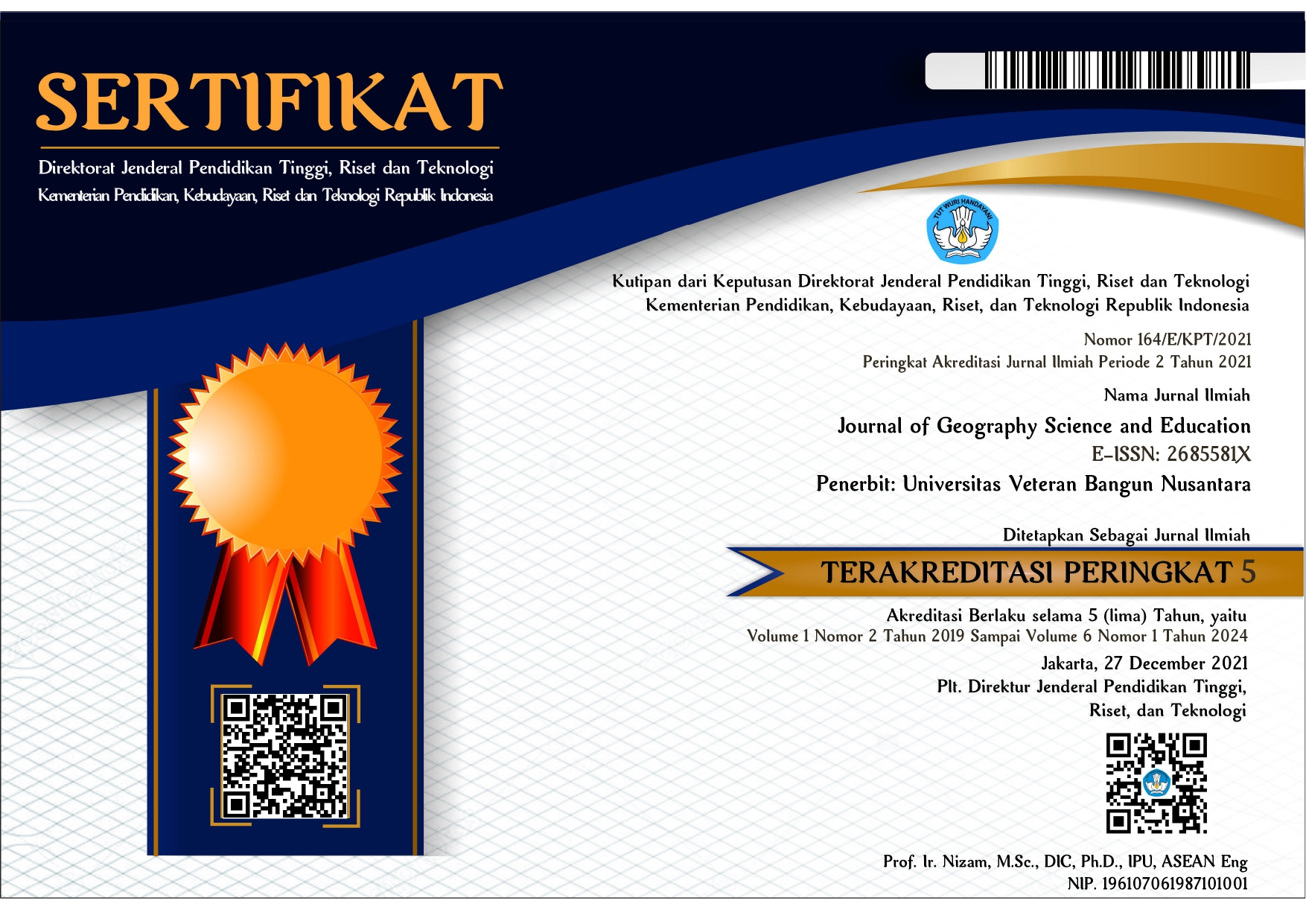THE INFLUENCE OF INDUSTRY ON THE KNOWLEDGE SOCIAL ECONOMY OF ENTREPRENEUR IN KARANGANYAR VILLAGE, WERU DISTRICT, SUKOHARJO REGENCY, 2020
DOI:
https://doi.org/10.32585/jgse.v2i2.1363Keywords:
distribution, marketing reach, socio-economyAbstract
This study aims to determine the distribution map of tofu industry in Karanganyar Village, Weru District, Sukoharjo Regency, to know the marketing coverage of the tofu industry in Karanganyar Village, Weru District, Sukoharjo Regency, to determine the socio-economic characteristics of tofu entrepreneurs in Karanganyar Village, Weru District, Sukoharjo Regency.
This research used a qualitative descriptive. Data collection techniques used field observations, questionnaires and documentation. The data analysis technique used data reduction, data presentation, drawing conclusions / verification. The results of this study are the distribution of tofu industry in Karanganyar Village, Weru District, Sukoharjo Regency, there are 44 industries spread in several hamlets. The marketing coverage of the tofu industry in Karanganyar Village covered the area throughout Soloraya and Yogyakarta such as Sukoharjo, Klaten, Wonogiri, Karanganyar, and Gunungkidul. The socio-economic characteristics of entrepreneurs are the majority of men, aged 15-64 years, are married, average education level is elementary school, length of business is 10-30 years, working hours are 7-10 hours per day, income level is more than IDR 2,000,000
and family dependents of less than 3 people. The socio-economic characteristics of the workers are the majority of men, aged 15-64 years, married status, average education level of elementary school, working more than 10 years, working hours 7-10 hours per day, income level of IDR 1,000,000 - IDR 2,000,000 and family dependents of less than 3 people.
Downloads
References
Basrowi dan Siti Juariyah. 2010. Analisis Kondisi Sosial Ekonomi Dan Tingkat Pendidikan Masyarakat Srigading Kecamatan Labuhan Maringgai Kabupaten Lampung Timur. Jurnal Ekonomi dan Pendidikan 7(1) 58-81.
Darsih. 2017. Peranan Sektor Industri Kecil Batu Bata Press Dalam Meningkatkan Pendapatan Masyarakat Di Kecamatan Tenayan Raya Kota Pekanbaru. Jurnal JOM Fekon, 4 (1), 956-967.
Edy Irwansyah. 2013. Sistem Informasi Geografis: Prinsip Dasar dan Pengembangan Aplikasi. Yogyakarta: Digibooks.
Hardiyanti, Qomariah. 2011. Kajian Kualitas Tahu Dari Kacang Tunggak dan Kedelai. Skripsi. Universitas Pembangunan Nasional “Veteran” Jawa Timur.
Kasmir. 2018. Pemasaran Bank. Jakarta: Kencana.
Mahakertha, Pande & Yuliarmi. 2019. Analisis Pengaruh Faktor Sosial Ekonomi Terhadap Keputusan Ibu Rumah Tangga Untuk Bekerja Di Desa Pemogan. E-Jurnal Ekonomi Pembangunan Universitas Udayana 8(9) 2009-2039.
Moleong, Lexy. J. 2017. Metode Penelitian Kualitatif. Bandung: Rosda Karya.
Salim, E. 2012. Kiat Cerdas Wirausaha Aneka Olahan Kedelai. Jakarta: Andi Offset.
Saraswati. Sawitri & Arwan Putra. 2016. Analisis Perubahan Luas Dan Pola Persebaran Permukiman (Studi Kasus: Kecamatan Tembalang, Kecamatan Banyumanik, Kecamatan Gunungpati, Kecamatan Mijen Kota Semarang Jawa Tengah). Jurnal Geodesi Undip 5(1) 155-163.
Sembiring, R. 2018. Dampak Perubahan Budaya Sosial Ekonomi Terhadap Kemiskinan Dan Kesejahterahan Pada Masyarakat Desa Pahlawan. Jurnal Kajian Ekonomi dan Kebijakan Publik 3(1) 75-82.
Sugiyono. 2017. Metode Penelitian Kuantitatif, Kualitatif dan R & D. Bandung : Alfabeta.
Downloads
Published
How to Cite
Issue
Section
License
Authors who publish with the Journal of Geography Science and Education agree to the following terms:
- Authors retain copyright and grant the journal the right of first publication with the work simultaneously licensed under a Creative Commons Attribution License (CC BY-SA 4.0) that allows others to share the work with an acknowledgment of the work's authorship and initial publication in this journal.
- Authors are able to enter into separate, additional contractual arrangements for the non-exclusive distribution of the journal's published version of the work (e.g., post it to an institutional repository or publish it in a book), with an acknowledgment of its initial publication in this journal.
- Authors are permitted and encouraged to post their work online (e.g., in institutional repositories or on their website) prior to and during the submission process, as it can lead to productive exchanges, as well as earlier and greater citation of published work.










